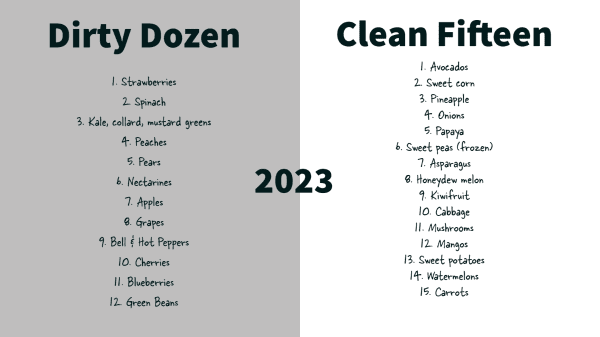The produce industry always dreads the release of the Environmental Working Group’s annual Dirty Dozen, as part of its Shopper’s Guide to Pesticides in Produce.
Some consumer media love the opportunity to scare consumers with tales about how their favorite fruit or vegetable is actually very harmful and deadly despite peer-reviewed scientific studies showing fruits and vegetables are as healthy as ever.


The Dirty Dozen came out last week, and the media pick up was small, much like it was in 2020, said Teresa Thorne, president of the Alliance for Food and Farming (AFF), a non-profit organization formed in 1989 to represent organic and conventional farmers of fruits and vegetables.
“Coverage is down this year, and more importantly, when it was released, there was a significant drop-off [from prior years] that has been quite dramatic,” she said March 22. “The lowest level was in 2020, when it was released during lockdowns. So far [this year] it’s mirrored those levels.”
She said 2021 and 2022 weren’t as high as the years before the pandemic.
“This year, there’s a bit of being out of touch and arrogant,” Thorne said. “Weather in the West has been significant. People are going through a lot. Farms and farmworker communities are being flooded.”
AFF has had some success in the past countering the EWG’s toxic messaging in consumer media as a source, but Thorne said this year has been tougher.
AFF released two blog posts last week after the Dirty Dozen was released, highlighting peer-reviewed science saying how fresh produce is safe and healthy.
Thorne said she thinks AFF’s message about having science on its side has helped steer some consumer media away from covering the EWG.
“It’s hard to cover and recommend the Dirty Dozen if you believe in peer-reviewed research,” she said.
Media coverage
Below are some examples of how consumer media covers the Dirty Dozen.
Of the media that covered the Dirty Dozen’s release, Thorne said CNN had the largest coverage, and its news affiliates account for about one-third of all consumer news coverage of the Dirty Dozen.
“Blueberries, beloved by nutritionists for their anti-inflammatory properties, have joined fiber-rich green beans in this year’s Dirty Dozen of nonorganic produce with the most pesticides, according to the Environmental Working Group, a nonprofit environmental health organization,” CNN said.
While CNN did not quote Thorne, despite her offering, it did quote Chris Novak, president and CEO of CropLife America, an industry association, who told CNN the report “willfully misrepresented” the USDA data.
He said, “Misinformation about pesticides and various growing methods breeds hesitancy and confusion, resulting in many consumers opting to skip fresh produce altogether.”
Real Simple says, “Buying all organic can be expensive. But buying all conventionally grown produce could expose you to a variety of pesticides linked to health and environmental issues, including some that have been already banned by the Environmental Protection Agency.”
Then it takes EWG’s damaging talking points to run down the 12 fruits and vegetables on the naughty list and pump up the 15 on the nice.
It quoted no one other than EWG and its allies.
Another example was Green Matters, which wrote:
“Seventy-five percent of those non-organic fruits and vegetables had pesticide contamination, and that largely reflects the practices of conventional agriculture,” says Alexis Temkin, Ph.D., a toxicologist for the EWG. “It’s often a lot higher for the fruits and vegetables on Dirty Dozen … It’s a lot closer to 90 percent for blueberries and green beans; for strawberries, about 99 percent of samples have pesticide residues.”
After all that scary info, Green Matters helpfully notes at the end of the article, “That said, don’t drive yourself up a wall if you aren’t able to purchase organic versions of the items on the Dirty Dozen list, since eating nutritious conventional produce is far better than not eating produce at all.”
That is, if a reader has gotten that far.



